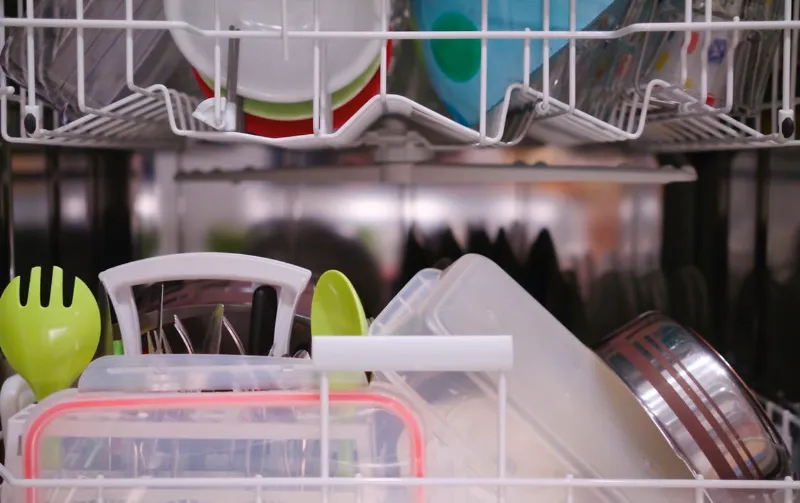Yes, mold in a dishwasher can make you sick. It can cause allergic reactions and respiratory issues.
Mold thrives in damp and warm environments, making your dishwasher an ideal breeding ground if not maintained properly.
Exposure to mold can lead to health problems, especially in individuals with mold sensitivities or weakened immune systems.
It’s important to keep your dishwasher clean and periodically check for signs of mold.
Regular maintenance can help prevent mold growth, safeguarding your health, and ensuring your dishes come out sparkling clean.
By addressing mold quickly and efficiently, you avoid potential health risks that come with prolonged exposure to these unwanted fungal invaders.
Remember, a clean dishwasher is not just about good hygiene; it’s about keeping your home environment safe and healthy for everyone.

Understanding Mold In Dishwashers
Mold growth in dishwashers is a common issue due to the moist and warm environment they provide.
Various factors, including leftover food particles, soap residue, and stagnant water, can contribute to this unwanted fungal growth.
Ensuring that the dishwasher is clean and free of excess moisture is essential to prevent mold from forming.
The causes of mold in dishwashers often stem from improper maintenance and ventilation.
Regular use of the appliance along with the accumulation of grease and debris creates an optimal breeding ground for mold spores.
Running the dishwasher frequently and cleaning it with mold-inhibiting solutions can greatly reduce the risk of mold development.
Identifying signs of mold in dishwashers involves looking for visible signs, such as black, green, or white specks along the rubber seals, door edges, and hidden surfaces.
An unpleasant, musty odor is a telltale sign that mold may be present.
Routine inspections and immediate action, if mold is found, are crucial in maintaining a healthy kitchen appliance.
Health Implications Of Mold In Dishwashers
Mold growth in dishwashers is not just unpleasant to look at, but it can lead to various health complications.
Individuals with mold sensitivity may experience allergic reactions, which include symptoms like sneezing, itching, runny nose, and skin rash.
The warm and moist environment of a dishwasher is perfect for mold spores to thrive, escalating the risk of exposure.
Molds are also known to cause respiratory issues in certain individuals, particularly those with pre-existing conditions such as asthma or chronic lung diseases.
Symptoms might encompass coughing, wheezing, and difficulty breathing.
Prolonged exposure to mold can aggravate these conditions and potentially lead to more severe health effects.
Ensuring your dishwasher is clean and free from mold is crucial for maintaining a healthy home environment.
Prevention And Remediation
Maintaining a clean and dry environment within your dishwasher is crucial for preventing mold growth.
Regularly wipe down the interior, including gaskets and seals, to remove moisture and food particles that foster mold.
Ensure you leave the door ajar after each cycle to allow for proper air circulation and drying.
Using a rinse aid can also assist in the reduction of excess water, thereby minimizing the potential for mold.
To adequately clean and maintain your dishwasher, monthly deep cleans are recommended.
Start by removing and cleaning the filter under running water.
Then, utilize a dishwasher-safe mold and mildew cleaner or a mixture of white vinegar and baking soda for a natural approach.
Run a full cycle with the cleaning agent, focusing on both high temperature and extra rinse settings if available.
Inspect and clean the spray arms to ensure they are not clogged, as this can contribute to water residue and mold.
In instances where immediate action is necessary.
Start by donning protective gloves and a mask to safety-remove mold spores.
Then, create a solution of bleach and water (1 cup bleach to 1 gallon water) or use a designated mold removal product.
After emptying the dishwasher, apply the solution to mold-infested areas, allowing it to sit for 10 minutes before scrubbing away the mold with a non-abrasive brush.
After scrubbing, run the dishwasher on the hottest cycle to rinse away any remaining spores.
Do note that bleach should be used with caution; it’s not suitable for all dishwasher interiors.
Frequently Asked Questions Of Can Mold In Dishwasher Make You Sick
Is Mold In Dishwashers Harmful?
Mold exposure, including from dishwashers, can lead to allergic reactions, respiratory issues, and other health problems in some individuals.
How Does Dishwasher Mold Develop?
Dishwasher mold often arises from lingering moisture, food particles, and warmth, creating a perfect breeding environment for fungi.
Can Dishwasher Mold Affect Air Quality?
Mold in dishwashers can release spores into the air, potentially reducing indoor air quality and posing health risks.
What Prevents Mold Growth In Dishwashers?
Regular cleaning, drying after use, and monthly vinegar cycles can prevent mold growth in dishwashers.
Conclusion
Mold in your dishwasher poses a real health risk. Regular cleaning mitigates this danger.
Don’t let unseen spores compromise your well-being.
Ensure your appliance maintains its purpose—cleaning, not contaminating. Prioritize your health; tackle dishwasher mold head-on.
